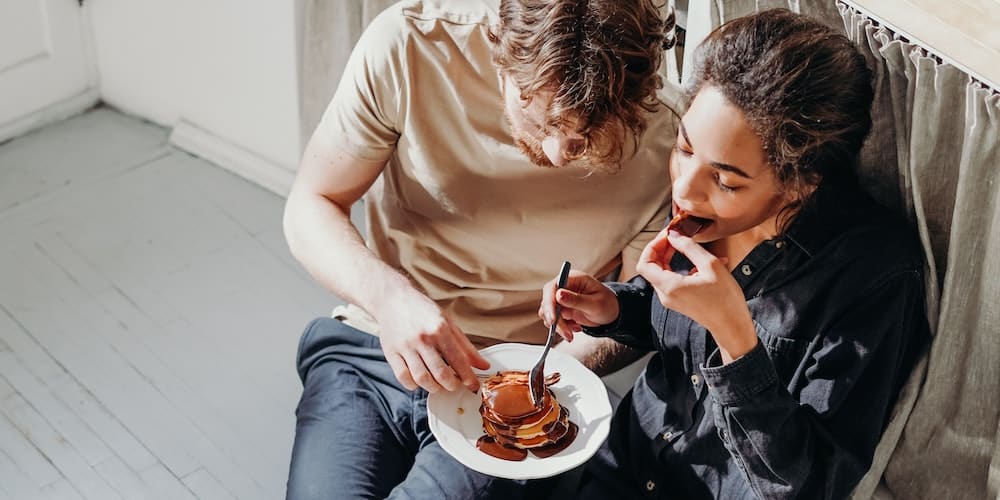At first, we wondered whether we’d have enough to eat. Or too much. How to prepare every meal for the whole family for an indefinite period?
Then there were the millions of exchanges on social media — recipes, tips, live streams on Instagram to make your own bread, cooking with peelings, a true revival of food porn. And official calls to buy French products, to favor local supply chains, to support our country’s agriculture.
But also warnings. Propaganda against the threatening lockdown pounds. Pressure to keep in shape — especially for women, and even more than usual — to make meals a sacred event of the day, to stay on course. Take the time to cook, not to ‘give in’ at the slightest frustration, and sometimes give in to treat yourself anyway…
If food has always been a cultural subject for the French (isn’t it said that we always talk about food or the next meal at the very moment we’re eating?), the lockdown has exacerbated passions. And also inequalities, social ones, and between men and women.
That’s why Darwin Nutrition commissioned a major survey from IFOP, during which 3,045 French people were questioned about their eating habits starting on March 17. To understand what was happening on our plates, our consumption patterns, our relationship to food, and how we see what comes next.
Lockdown leads to slight weight gain (and that’s okay)
Let’s get the first finding out of the way right away: no, you are not alone, the majority of us have gained a little weight (57% of respondents). 2.5 kg on average since the start of the lockdown, and men a little more than women.
Lack of physical activity, idleness, the anxiety caused by being confined and the snacking that comes with it are not unrelated. But wasn’t gaining weight also driven by the very fear of gaining weight, of doing things wrong, of ‘failing’ during lockdown?

We observe that unemployed people, those with low levels of education, or people from poor backgrounds have been more affected by this weight gain. Santé Publique France is currently conducting a survey, which shows that stress and depression during quarantine affect these same people much more.
Towards a healthier diet?
A direct consequence of this widespread weight gain: 56% of French people want to eat healthier and more balanced meals after the lockdown, without necessarily going on a strict diet. In that respect, we have understood that physical and psychological well-being comes less from restrictive diets than from informed choices, quality, and variety in one’s diet.
Women are more likely to want to eat more balanced meals after lockdown (60% vs. 51% of men), but they are also more likely to want to go on a strict diet (21% vs. 15% of men). It was already known that they were the largest consumers of fat-burning supplements.

What about the quality of meals during lockdown? We note that 42% of French people spend more time than before preparing meals, and 29% make more ‘homemade’ foods, like bread and yogurt. Furthermore, 21% of French people report using home delivery services less.
Consuming local products is an increasingly widespread issue. 35% of respondents say they place more importance on the local nature of their food since March 17. La Ruche Qui dit Oui! has seen its number of orders triple across France, and 30,000 new customers have turned to this direct-from-producer buying network since the start of the lockdown.
It’s not only about consuming healthier food, but also about supporting local producers.

Organic food is definitely no longer an emerging trend but a ‘crisis winner’ sector that will need to become widespread, for our good and that of the planet. A survey conducted by the Boston Consulting Group suggests that Europeans expect to consume more fresh and organic products in the coming months (to the detriment of other spending categories, such as fashion or luxury).
This is not new, but foods from organic farming remain the preserve of wealthier groups, 24% of whom have been consuming more since March 17, compared with 16% across all groups.
There hasn’t been an explosion in home delivery of fruits and vegetables or ready-made meals, although there has been strong growth in home meal box and meal-kit delivery services.
Our buying guides written by experts:
– Marine collagen
– Spirulina
– Cat kibble
– Hair supplements
– Omega-3
\”The ‘After’\”: a growing awareness of the environmental issues surrounding food, especially among young people
If topics such as short supply chains, organic products, or sustainable production were already important (at least symbolically) before the lockdown, they will be even more so in the future. Crises like the one we are going through have dramatic effects, but can also be drivers of incredible change.
Has the pandemic made the French more environmentally responsible? We can see it in air travel, consumption, and mass tourism, the reduction of which is perceived as beneficial (for the planet).

And our eating habits are no exception, since 29% of French people say they will place more importance on the environmental impact of their diet after May 11.
As a reminder, food alone accounts for a quarter of the carbon footprint of the French, with production being the most polluting stage.
And “the world after”? Generation Z and millennials, while doubting institutions’ ability to make progress on environmental issues, are convinced that the crisis will have a positive impact on culture and society, as confirmed by a study from Vice Media Group.
Young people, and in particular students, say they will place greater importance on the balance of their diet after lockdown (42% of students versus 33% across all categories), and on the impact of that diet on the environment (37% of students versus 29% across all categories).
Gender inequalities exacerbated by the lockdown
One could logically have hoped that, with equal time spent in the domestic sphere, men and women would have moved toward equality in the division of tasks. This is not the case, and it is one of the main findings of this survey.
During the lockdown, food within heterosexual couples has been a source of tension and an increase in inequalities between men and women. 42% of respondents reveal that the division of meal preparation was a source of tension within the couple, and only 21% of men say they participate more than before in preparing meals.

Thus, women (60% of them) are primarily responsible for meals within the couple… versus 58% before the lockdown (BVA survey of 2017)! Inequalities have therefore increased, and the imbalance remains glaring across all social categories, particularly among retirees and low-income and poor groups.
Students and couples who have been together for less than a year are the closest to parity, though they do not reach it.
The situation is even more suffocating than in “normal” times since the number of meals to prepare has increased (and sometimes the number of people per household as well), as has the time devoted to children.
Unfortunately, the issue of cooking is still extremely gendered. And the lockdown, far from having lightened the mental load (the overall burden) of women regarding meal preparation, has intensified it.
Methodology: Ifop study for Darwin Nutrition conducted online from April 24 to 27, 2020 among a sample of 3,045 French people aged 18 and over residing in metropolitan France.
Image: Pexels / Cottonbro



